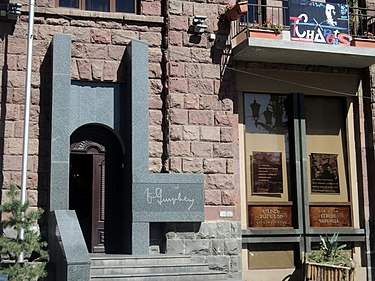The house-museum of Yeghishe Charents (1897-1937) in Yerevan keeps the memory of one of the greatest names of Armenian poetry and symbol of the Stalinist purge of Armenian intelligentsia in 1936-1938.
The museum, installed at the building where Charents lived the last two years of his life (6 Sundukian Street at the time, now Mashtots Avenue 17), was created by decision of the Council of Ministers of Soviet Armenia in February 1964. It opened its doors on January 30, 1975.
The building was partially modified and the surface of the museum enlarged on the 90th anniversary of Charents’ birth (1987), . The inventory of the house-museum includes more than 8,000 pieces.
The other apartments showcase objects, copies, paintings, and other items related to Charents and his contemporaries. The most hallowed section is the memorial home, the residence of the poet, which has been restored according to its original features. The home has been furnished with a combination of Eastern and European objects, including the original desk, secretaire, couch, the rugs inherited by Charents from his father, the Chinese backboard, the bronze statuettes of Buddha, the “Underwood” typewriter, and the reproductions of works by Leonardo da Vinci, Fra Angelico, and Giotto.
Photos, paintings, daily objects, and other items related to Kars, Charents’ birthplace, are showed in the first hall. The second hall is devoted to museum events and temporary shows. The third hall introduces the life and work of Charents.
The memorial home includes Charents’ personal library, which accounted for close to 6,000 volumes in the 1930s. Most books were destroyed after his arrest in 1937. Currently there are 1,422 volumes in the library, which consists of Armenian, Russian, and other foreign-language valuable books. Many of them contain the poet’s autograph, as well as marginal notes in his handwriting.
The museum has had five directors since its inception. The first director was Nvard Baghdasarian (1975-1983). The current director, since 2020, is museologist Zhanna Manoukian.

